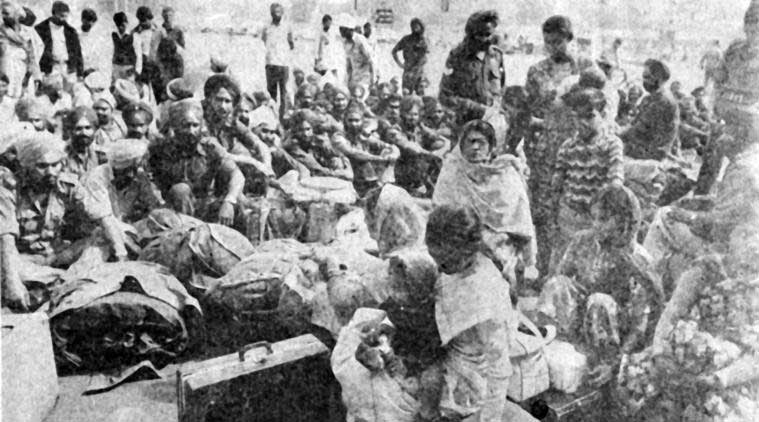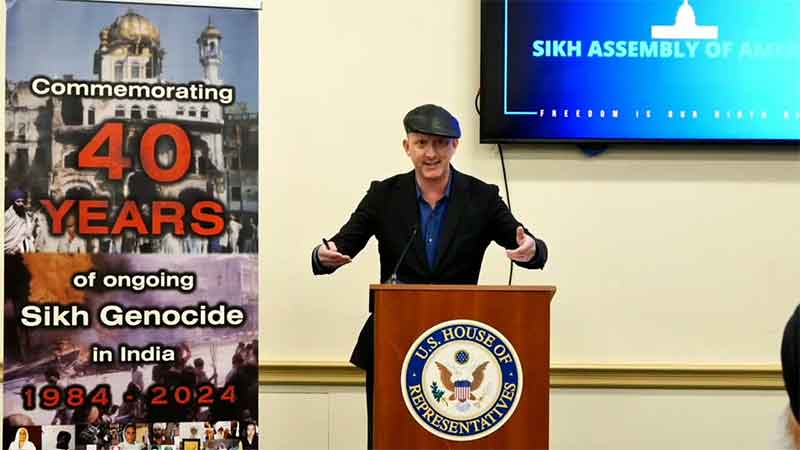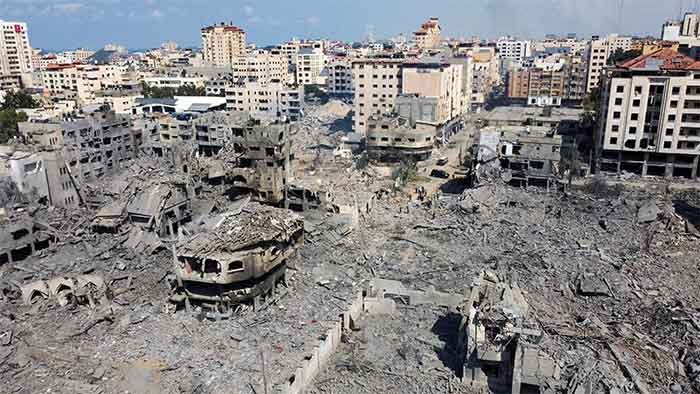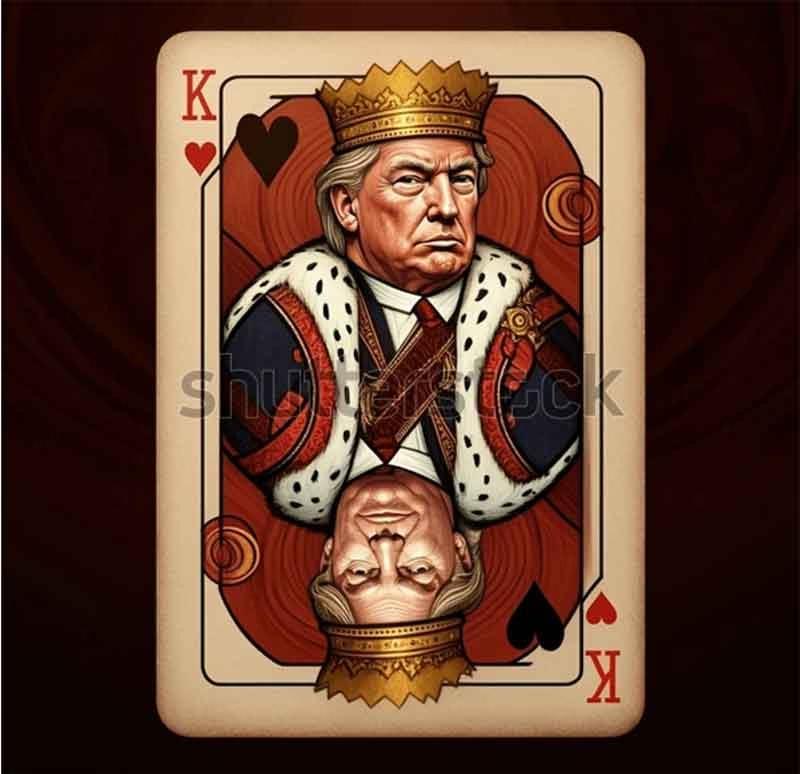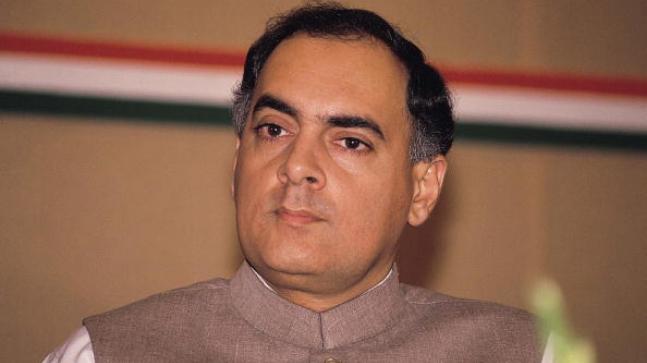
On December 17, 2018 two very conflicting signals emanated from the world’s so called largest democracy.
While the Delhi High Court pronounced one accused involved in the 1984 Sikh massacre guilty, the other was sworn in as the Chief Minister of Madhya Pradesh.
Thousands of Sikhs were murdered all over India following the assassination of then Prime Minister Indira Gandhi by her Sikh bodyguards at her official residence in New Delhi on October 31, 1984.
The assassins were enraged at the army attack on the Golden Temple Complex, holiest shrine of the Sikhs, in June that year. The controversial military operation was ordered by Gandhi to flush out a handful of religious extremists who had stockpiled arms inside the place of worship. Following her murder, activists belonging to Gandhi’s Congress party organized anti-Sikh pogroms in different parts of the country. In New Delhi alone close to 3,000 people died. Congress leaders were seen instigating the mobs that were supplied with kerosene and tires to burn Sikh men alive. Sikh women were gang raped during the violence, while their homes, businesses and gurdwaras were burnt.
While Sajjan Kumar was convicted and given a life sentence after 34 years for conspiracy behind murders and the sacrilege of a Sikh temple, Kamal Nath wasn’t even charged, in spite of the fact that both were seen at the trouble spots.
Nath has now taken charge of the Chief Minister’s office in Madhya Pradesh. Notably, the police that shamelessly connived with the mobs tried to shield all the Congress leaders involved. They either refused to file criminal cases against senior politicians or tampered with the evidence and testimonies. That is the reason why it took so long for the courts to finally convict Kumar, whereas Nath remains unpunished.
But someone much taller in stature and position than these two individuals remains unindicted.
There is enough evidence available in the public domain against the late Rajiv Gandhi, the son of Indira Gandhi, who succeeded her as the next Prime Minister. His complicity made it even more difficult to bring people like Kumar and Nath to justice.
That explains why his son, the current Congress party leader Rahul Gandhi, continues to be on the defensive whenever his party is grilled on the inconvenient issue of 1984. That he refuses to acknowledge the party’s involvement in the massacre has to do with the fact that his own father was responsible for one of the worst massacres in post-British India. Admitting that would not only rupture the reputation of his father, but also the image of his party, which claims to be secular, unlike the currently ruling right wing Hindu nationalist Bhartiya Janata Party (BJP).
The recent developments have only made matters worse for Rahul. Though Kumar has resigned from the party after his conviction, in an attempt to save it from embarrassment, Nath’s appointment as Chief Minister has eclipsed the “secular” image of the Congress. While it is obvious that Rahul would never admit that his father was involved in crimes against humanity, the facts speak for themselves.
Firstly, when Rajiv Gandhi went to see his mother at the hospital where she was admitted after being shot, low intensity attacks on the Sikhs had already begun. So much so, the car of the then turbaned Sikh President Zail Singh was vandalized. He did not show any leadership by standing up for the innocent Sikhs who were being punished by the angry mobs.
The most glaring instance of Gandhi’s approval of violence was the chanting of the slogan “blood for blood” in his presence by people who had come to pay last respects to Indira Gandhi as her body lay in state.
This was relayed live on the public broadcast, witnessed on TV by many people, including this writer. There is no evidence that Gandhi did anything to stop such provocative sloganeering.
While he was being sworn in as Prime Minister, the Sikhs were being targeted by the goons of his party. He did not find time to press the paramilitary forces into service to stop the bloodshed. He never used the power of the Prime Minister’s Office to save a minority community that needed protection of the state. He never found time to go out and rescue the citizens of his country from the mobs.
It is well documented how his office remained unresponsive to the calls made for assistance by the President and the Home Minister, who was in charge of law and order.
Zail Singh revealed in his autobiography that the PMO did not show any interest in stopping the violence when he tried approaching it on behalf of Sikh citizens who had called him for help.
Similarly, the then home minister, P.V. Narsimha Rao, failed to get any favourable response when he called the PMO after being approached by several activists for immediate intervention. The most powerful PMO thus completely failed to act and save the country from disgrace. Rajiv Gandhi, head of the nation throughout the first week of November, was clearly responsible for what happened in New Delhi and elsewhere.
A few days later, while addressing a big public meeting, Rajiv Gandhi openly justified the anti-Sikh violence by saying that when a big tree falls, the earth around it shakes a bit. Although he acknowledged that the assassination of his mother was followed by mayhem, he never condemned the killings of ordinary Sikhs. Notably, when he himself was assassinated by Tamil separatists in 1991, there was no such violence directed against Tamils in India. His statement wasn’t just an emotional outburst. It was aimed at covering up the fact that it wasn’t a natural reaction to his mother’s death, but a well calculated mob attack against a particular community.
In the general election that took place in December 1984, his party won a huge majority in the parliament on the plank of national unity. Those involved in the Sikh massacre got massive support from the electorate. Rajiv Gandhi succeeded in polarizing the Hindu majority. It is well known that the BJP vote bank also shifted to the Congress. We don’t need rocket science to understand why the BJP only got two seats in the parliament. After all, several BJP supporters also participated in the massacre.
Those who played a significant role in the violence were rewarded with ministerial positions, even aside the question of punishing them and the police officers complicit in the carnage.
It is pertinent to mention that Gautam Kaul, one of the senior police officers who remained indifferent toward the mobs who had gathered outside a historic Gurdwara to target the Sikh worshippers, was Rajiv Gandhi’s cousin. It was the same location where Nath was seen hanging out with a mob that had killed two Sikhs.
Another cousin of Rajiv Gandhi was instrumental in getting access to the voters’ list of Sikhs, which was allegedly used by mobs to identify their homes during the violence.
Initially, Rajiv Gandhi remained adamant over the demands for ordering an inquiry into the massacre. He declined to order one, claiming that this would disturb peace. Nevertheless, his government was forced to constitute a first commission of inquiry into the anti-Sikh violence, under former Chief Justice Ranganath Misra, as part of a political understanding with the moderate Sikh leadership of Punjab to end Sikh militancy. Misra, who gave a clean chit to the government, was later rewarded with a seat in the upper house of the parliament.
A retired police officer from Punjab, Julio Ribeiro, writes in his book that as a security adviser, he suggested to Rajiv Gandhi that to win over the confidence of the Sikh community and defeat militancy, he must take action against some key Congress leaders involved in the massacre. Ribeiro claims that when he did this, he was scolded by an infuriated prime minister.
In one media interview, Rajiv Gandhi also tried to blame Sikhs for the violence, saying that most killings took place in areas where the Sikhs celebrated the murder of Indira Gandhi. Such rumours were commonly spread by Congress supporters to create an environment of hatred against the Sikhs.
It is high time that the Congress come out of denial, and honestly admit that Rajiv Gandhi was culpable in the anti-Sikh violence, if it wants to go to the election this year with one point mandate of secular India free from the clutches of right wing forces. His indictment is important to settle everything. Let him be charged and tried posthumously, and go down in the history as a villain like Hitler. If Indian Prime Minister Narendra Modi can be described as a merchant of death by the Congress for his involvement in a 1984-like pogrom against Muslims in 2002, despite also not being charged, Rajiv Gandhi does not deserve to be seen as a stainless Prime Minister.
It is a fact that attacks on religious minorities have grown under the Modi government ever since it came to power with a brute majority in 2014, but the process of picking a minority group and scapegoating it to promote majoritarianism started with men like Rajiv Gandhi much earlier. Had 1984 not happened, Modi wouldn’t have dared to repeat the 2002 Muslim massacre in Gujarat with impunity. Modi was the Chief Minister of the state when the anti-Muslim massacre broke out following the burning of a train carrying Hindu pilgrims. Over 50 people died in the incident that was blamed on Muslim fundamentalists by the Modi government in Gujarat. The methodology that was used against the Sikhs in 1984 was reapplied on Muslims in Gujarat by the BJP leaders with the help of the police.
The BJP wouldn’t have ascended to power by creating the “us versus them” divide and othering minority communities if the Congress under Rajiv Gandhi had not started an era of impunity for mass murderers. It was mainly the Sikh community that was subjected to state violence in 1984, while today all minorities have become vulnerable under an outright communal government.
Rumours to create fear of Muslims, Christians, Dalits and tribal people are more frequently used today by the supporters of BJP to stir mob lynching. Similarly, rape as a weapon is also used against the women of these communities to humiliate them. Their prayers and rituals are constantly disrupted on one pretext or the other. To understand our present, we need to analyze our past with honesty, and that requires indicting Rajiv Gandhi for his original sin which laid the ground for violence against minorities in India.
It’s a shame that he was given Bharat Ratna, a highest civilian award, which needs to be revoked. A failed attempt was made in the Delhi Legislature to bring a motion asking to strip Gandhi of the award. The ruling Aam Aadmi Party (AAP), which claims to be an alternative to both the Congress and the BJP, failed to make a case due to the reverence of some of its members for Rajiv Gandhi. Harvinder Singh Phoolka – a human rights lawyer who has been fighting for justice to the victims of 1984 – was prompted to resign from the AAP for this reason.
By making Gandhi accountable, we can certainly defeat majoritarianism, which is the root of the problem. By simply seeking a replacement for Modi and his BJP we can only get temporary peace under a party that has lost every moral right to question the BJP’s sectarian politics.
Gurpreet Singh is a Canada- based journalist who publishes Radical Desi- a monthly magazine that covers alternative politics

